
Ever heard of a skincare product that can be your shield, sword, and fairy godmother all rolled into one?
Vitamin C oil is a potent antioxidant that's quickly becoming a cult favorite amongst beauty enthusiasts. But before you dive headfirst into a bottle, let's explore what this magic potion is all about!
Vitamin C oil is a popular skincare component packed with a concentrated form of vitamin C, a powerful antioxidant typically derived from natural sources such as citrus fruits or synthesized in a laboratory. Vitamin C oil is used topically on the skin and is known for its ability to brighten the skin, reduce the appearance of dark spots and hyperpigmentation, stimulate collagen production, and protect the skin from environmental damage. It is commonly used in skincare products such as serums, creams, and oils.
Imagine a concentrated dose of sunshine bottled up in a luxurious oil – essentially what vitamin C oil is. It's a carrier oil (like jojoba or rose oil) infused with a stable form of vitamin C, typically L-ascorbic acid.

When your skin is constantly exposed to pollutants, toxic chemicals in the air, stress, UV rays, chronological aging, and occasionally poor lifestyle choices too, it needs extra protection from the signs of aging showing up in the form of wrinkles, dark spots or fine lines.
Think of vitamin C oil as your skin's hero. Vitamin C oil is loaded with an antioxidant like ascorbic acid that fights the free radicals to protect your skin from aging rapidly. It stimulates collagen production, the protein that, apart from reducing signs of aging, keeps your skin plump and youthful, and helps reduce hyperpigmentation, leaving you with a brighter, more even-toned complexion.
Vitamin C is naturally found in the dermal and epidermal layers of the skin, more so in the epidermal layer. But with aging, and exposure to UV light or pollutants and toxicants, the vitamin C content in the epidermal layer gets reduced creating a need for boosting your skin with vitamin C.

Combats Visible Signs of Aging: Say goodbye to those pesky lines and wrinkles with Vitamin C oil by boosting the amount of collagen available in your skin, reducing the appearance of fine lines and wrinkles.
Boosts Collagen Production: Collagen, a structural protein, is the magic ingredient that keeps your skin looking youthful and supple. It supports the maintenance of the structure and texture of the epidermal layer that tends to loosen with age. Vitamin C oil acts like a cheerleader for collagen production, encouraging your skin to produce more of this essential protein.
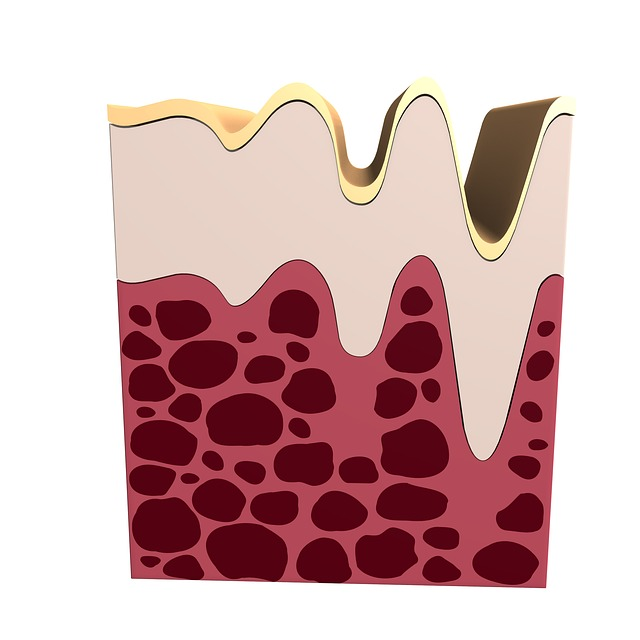
Brightens and Evens Skin Tone: Get rid of the appearance of unwanted dark spots left by sun damage, acne scars, and other factors. Vitamin C oil, helps fade the appearance of these spots and even out your skin tone, leaving you with a radiant complexion.

Boosts skin's natural defense: Vitamin C helps to strengthen the skin's natural defense mechanisms, making it more resilient to environmental stressors and pollutants.

Protects Against Sun Damage: Sun exposure is a major contributor to premature aging and skin damage. Vitamin C oil acts as a shield, protecting your skin from harmful UV rays and preventing future sun damage.
Promotes Wound Healing and Scar Fading: Vitamin C oil isn't just about aesthetics; it can also help with wound healing. Its anti-inflammatory properties can aid in wound healing and even help fade the appearance of acne scars.

Reduces Inflammation and Redness: Struggling with redness and inflammation? Vitamin C oil's anti-inflammatory properties can help soothe your skin, reducing redness and irritation.

Minimizes the Appearance of Pores: Large pores can be a concern for many. The good news is, vitamin C oil can help! Its astringent properties can help minimize the appearance of pores, leaving your skin looking smoother and more refined.

Hydrates and Moisturizes the Skin: While vitamin C oil isn't technically a moisturizer, it can help improve your skin's hydration. By promoting collagen production, which helps your skin retain moisture, it can leave your skin feeling more hydrated and supple.

Melanin reduction: Vitamin C helps inhibit the production of melanin, the pigment responsible for skin color. This can help fade hyperpigmentation and even out skin tone.
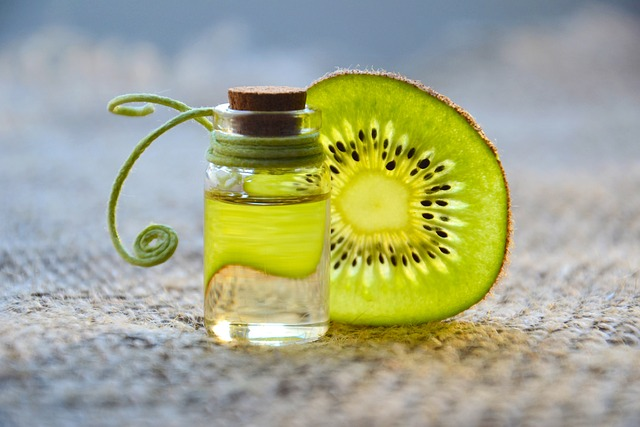
Finding the perfect vitamin C oil for your skin type and needs requires some knowledge. Is it an uneven skin tone you are fighting or scars from exhaustion?
Here are some key factors to consider:

Not all vitamin C is created equal, and the specific form used in the oil can impact its stability and effectiveness. Here are two common forms found in vitamin C oils:

This is the most potent and researched form of vitamin C, but it's also the most unstable and can easily degrade when exposed to light and air. Look for an oil packaged in an air-tight, dark container to maintain its potency.
This form is more stable than L-ascorbic acid but may be slightly less potent. It's a good option for those with sensitive skin or who prefer a longer shelf life.
Ascorbyl palmitate and ascorbyl tetraisopalmitate are some forms of oil-soluble vitamin C.

The concentration of vitamin C in the oil typically ranges from 5% to 20%. While a higher concentration might seem more powerful, it's not always true. Start with a lower concentration (5-10%) if you have sensitive skin and gradually increase as your skin tolerates it.

Dry skin can benefit from vitamin C oil blended with nourishing carrier oils like jojoba or rosehip. Oily skin might prefer lighter oils like grapeseed or marula.
Look for oils containing complementary ingredients like vitamin E (boosts stability and has antioxidant properties), hyaluronic acid (hydrates), or turmeric (brightening and anti-inflammatory).
Shankara's Rich Repair Moisturizer boasts of active ingredients like Jojoba Oil ester, Avocado Oil ester, Canola Oil, Coconut Oil ; Aloe Leaf Juice, Algae Extract; Turmeric Oil, Xanthophylls, Crambe Oil, Beta-Carotene, Tocopherol, Rosemary Leaf Extract; Hydrogenated Lecithin; Unrefined Shea butter; Aspen bark extract; Sodium Gluconate; Cocoa seed butter; essential oils of Rose Absolute and Bergamot; Xanthan Gum, Lecithin, Sclerotium Gum, Pullulan; Hydroxyethylcellulose; among others!
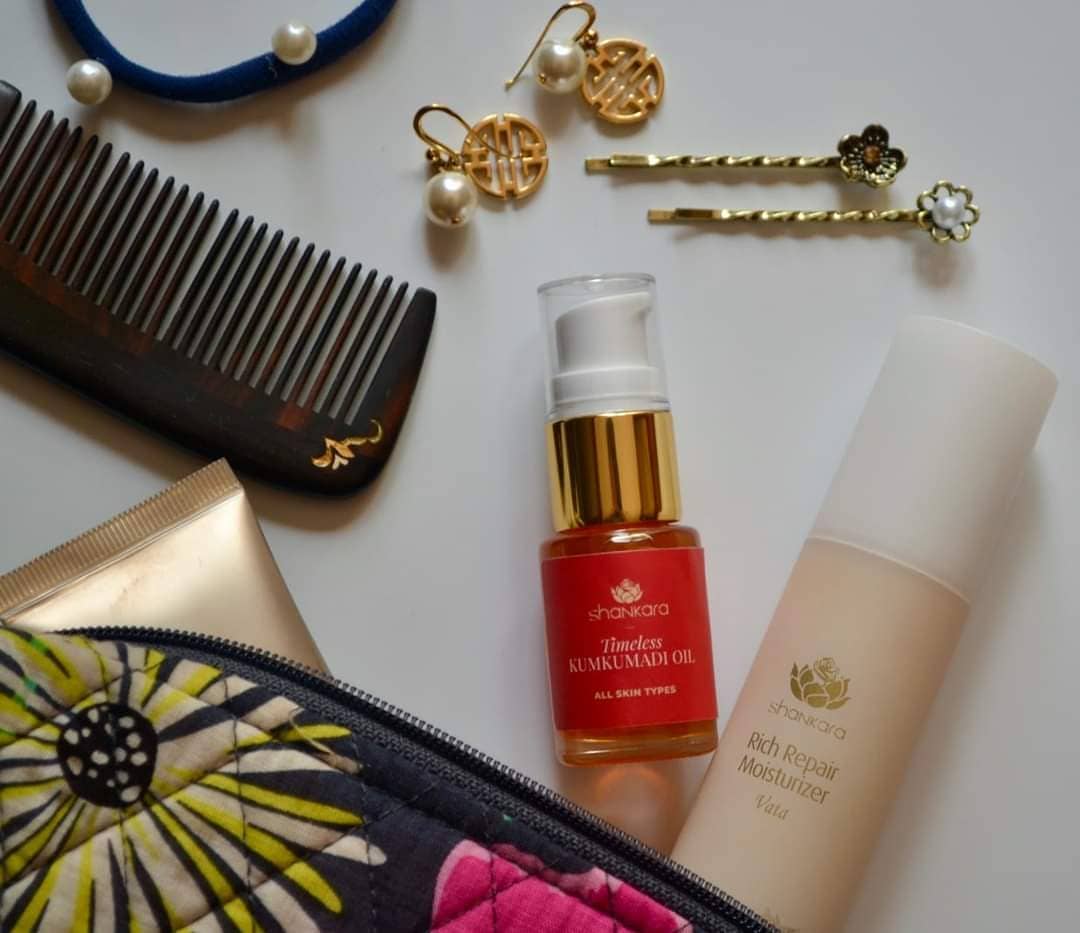
Choose a reputable brand known for using high-quality ingredients, varieties of seed oil and employing safe manufacturing practices.
Remember - always do a patch test on a small area of your inner arm before applying any new product to your face. This helps identify any potential allergic reactions.
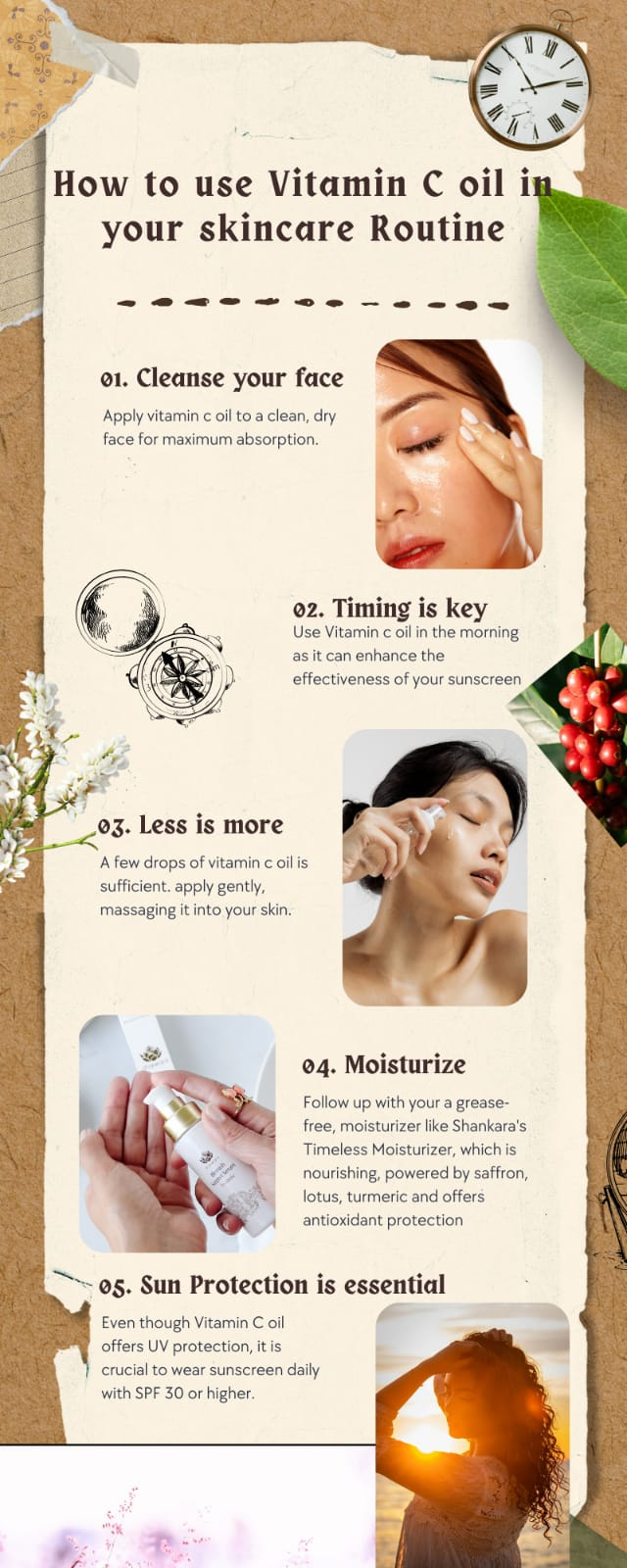
Cleanse your face: Apply vitamin C oil to a clean, dry face for maximum absorption.

Timing is key: Use vitamin C oil in the morning as it can enhance the effectiveness of your sunscreen.

Less is more: A few drops of vitamin C oil are sufficient. Apply gently, massaging it into your skin.
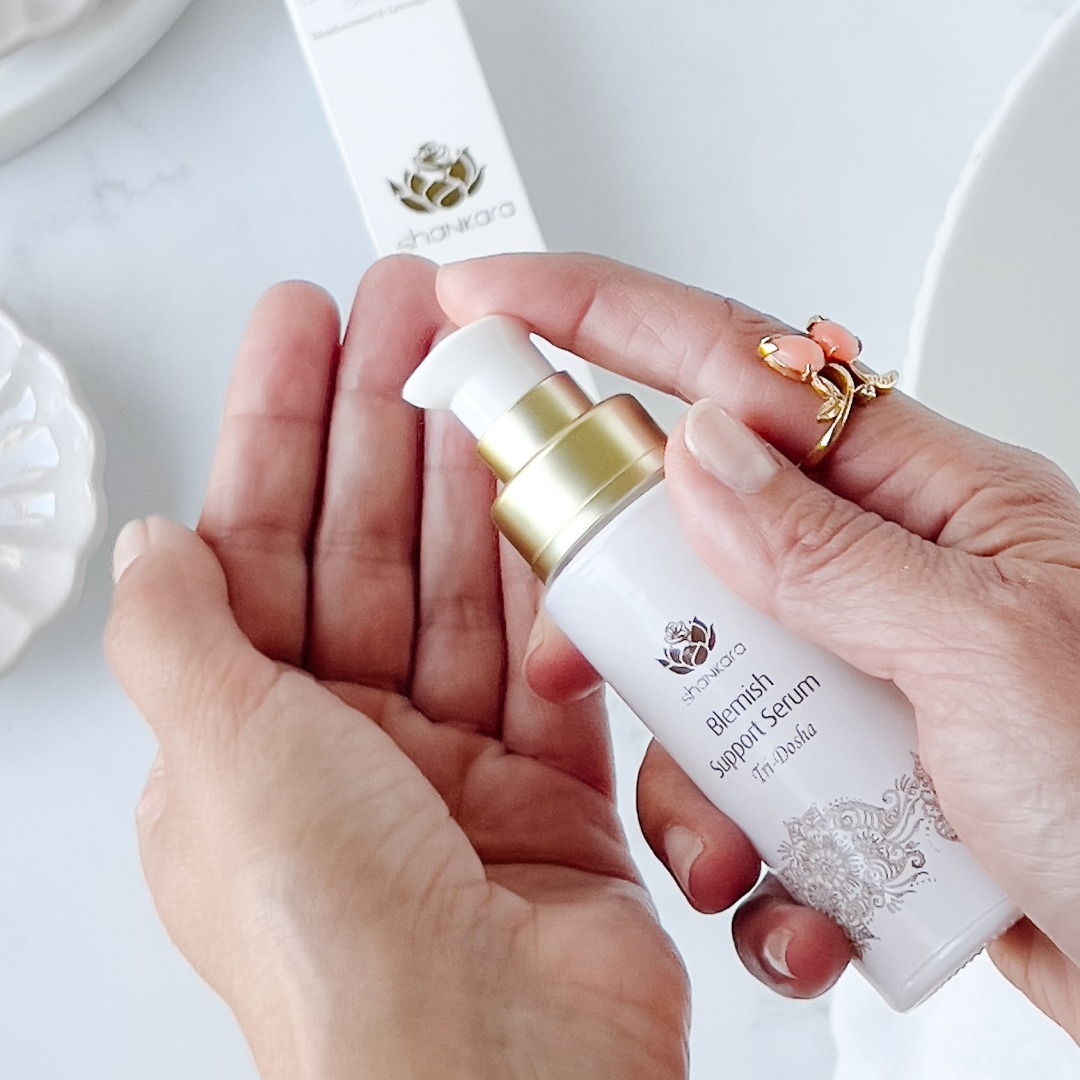
Moisturize: Follow up with your regular moisturizer to lock in hydration.

Sun protection is essential: Even though vitamin C oil offers some UV protection, it's crucial to wear sunscreen daily with SPF 30 or higher.

4 potential side effects to consider:
Irritation: Vitamin C oil can cause mild tingling or irritation, especially for those with sensitive skin. If the irritation persists, discontinue use.
Sun sensitivity: Vitamin C oil can increase your skin's sun sensitivity. Be extra vigilant about sun protection and avoid using it before sun exposure.
Avoid eye area: Apply vitamin C oil only to your face, avoiding the delicate eye area.

Not for everyone: If you have eczema or rosacea, consult a dermatologist before using vitamin C oil.


Both vitamin C serums and oils offer similar brightening and antioxidant benefits, but there are key differences:
Texture: Serums are typically water-based and have a lightweight, watery consistency. Oils are well, oily, and feel more substantial on the skin.
Absorption: Serums generally absorb faster and deeper into the skin. Oils take longer to absorb and may leave a slightly greasy residue.
Skin Type: Serums work well for most skin types, but oily skin might prefer them even more. Oils are generally suitable for dry and normal skin types.
Ultimately, the best choice depends on your skin type and preferences. If you prefer a lightweight, fast-absorbing option, a vitamin C serum might be ideal. If you're looking for a more hydrating and nourishing product, a vitamin C oil could be a better fit.

Is Vitamin C Oil Right for Me?
Vitamin C oil offers a potent blend of antioxidant and brightening properties, making it a valuable addition to most skincare routines. However, it's not a one-size-fits-all solution.
What factors do I need to keep in mind before adding it to my skincare routine?
Consider the following factors before incorporating it into your regimen:
Skin type: Dry and normal skin types can generally benefit from vitamin C oil. If you have oily skin, choose a lightweight oil or opt for a vitamin C serum.
Sensitivity: If you have sensitive skin, start with a low concentration of vitamin C and patch test before applying it to your entire face.
Sun protection: Regardless of whether you use vitamin C oil or not, consistent sun protection is crucial for maintaining healthy, youthful skin.
How should Vitamin C oil be used?
Vitamin C oil is typically applied to clean, dry skin once or twice daily. It can be used alone or layered under moisturizer and sunscreen. It is important to follow the product instructions and avoid contact with eyes.
Can Vitamin C oil be used with other skincare products?
Vitamin C oil can be used with other skincare products. However, it's best to avoid layering it with strong exfoliants or retinoids as they can irritate your skin. If unsure, consult a dermatologist for personalized advice.
How long does it take to show results?
It usually takes 4-8 weeks of consistent use to see noticeable results with vitamin C oil. However, this can vary depending on individual factors like skin type, concentration of the oil, and sun exposure.
Does Vitamin C oil expire?
Vitamin C oil does expire, especially L-ascorbic acid formulations. Look for an expiration date on the product and store it in a cool, dark place to maximize its shelf life.
Can Vitamin C oil be used during pregnancy or breastfeeding?
It is generally safe to use Vitamin C oil during pregnancy or breastfeeding, but it is always best to consult with a healthcare professional before starting any new skincare regimen during this time.
By understanding the benefits, potential counterindications, and how to use vitamin C oil safely and effectively, you can decide if it's the right choice to add a healthy glow to your skin.
Remember, consistency is key! With regular use and proper sun protection, vitamin C oil can truly become your skin's new BFF, helping you achieve a brighter, healthier, and more even complexion.













comments (0)